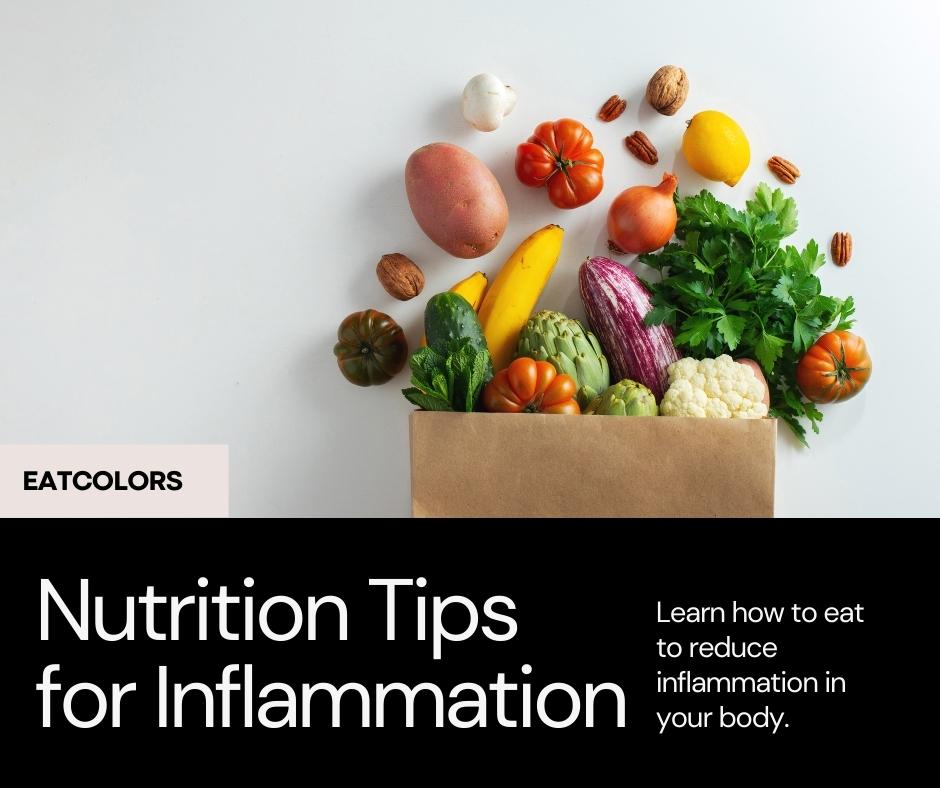- Eat Whole Foods: Focus on whole, unprocessed foods. These are rich in nutrients and antioxidants that can help reduce inflammation.
- Anti-Inflammatory Fats: Choose healthy fats such as olive oil, avocados, nuts, and seeds. Omega-3 fatty acids found in fatty fish like salmon and flaxseeds are particularly beneficial.
- Colorful Fruits and Vegetables: Aim to fill half your plate with a variety of colorful fruits and vegetables. They are high in antioxidants and phytonutrients.
- Whole Grains: Opt for whole grains like quinoa, brown rice, and oats over refined grains like white bread or pasta.
- Lean Proteins: Choose lean sources of protein like poultry, fish, beans, lentils, and tofu.
- Spices and Herbs: Incorporate anti-inflammatory spices like turmeric, ginger, and garlic into your meals.
- Hydration: Drink plenty of water and herbal teas to stay hydrated.
- Limit Sugar and Processed Foods: Reduce your intake of sugary beverages, sweets, and processed foods, as they can promote inflammation.
- Moderate Alcohol: If you drink alcohol, do so in moderation.
- Stay Active: Regular exercise can help reduce inflammation, but don't overexert yourself.
- Manage Stress: Chronic stress can contribute to inflammation, so practice stress-reduction techniques like meditation or yoga.

Sample Anti-Inflammatory Meal Plan:
Day 1:
Breakfast:
Greek yogurt with berries and a drizzle of honey.
Whole-grain toast with almond butter.
Lunch:
Grilled chicken salad with mixed greens, cherry tomatoes, cucumbers, and a balsamic vinaigrette.
Snack:
Carrot and celery sticks with hummus.
Dinner:
Baked salmon with a side of quinoa and steamed broccoli.
Sliced avocado with a sprinkle of turmeric.
Day 2:
Breakfast:
Oatmeal topped with sliced bananas, walnuts, and a dash of cinnamon.
Lunch:
Lentil soup with a side of mixed greens and a lemon-tahini dressing.
Snack:
A small handful of mixed nuts.
Dinner:
Stir-fried tofu with broccoli, bell peppers, and snap peas in a ginger-garlic sauce served over brown rice.
Day 3:
Breakfast:
Smoothie with spinach, frozen berries, Greek yogurt, and a tablespoon of chia seeds.
Lunch:
Quinoa and black bean salad with diced avocado, corn, and cilantro-lime dressing.
Snack:
Sliced cucumber with tzatziki sauce.
Dinner:
Grilled shrimp with roasted sweet potatoes and sautéed spinach.

Day 4:
Breakfast:
Scrambled eggs with spinach, tomatoes, and feta cheese.
Lunch:
Turkey and avocado wrap with whole-grain tortilla and a side of mixed greens.
Snack:
Apple slices with almond butter.
Dinner:
Baked cod with a side of asparagus and quinoa.
Day 5:
Breakfast:
Chia pudding made with almond milk and topped with fresh mango and shredded coconut.
Lunch:
Spinach and kale salad with grilled chicken, strawberries, and a vinaigrette dressing.
Snack:
A small bowl of mixed berries.
Dinner:
Vegetable curry with chickpeas served over brown rice.
Recommended Fruits, Vegetables & Herbs
Fruits:
Berries: Blueberries, strawberries, raspberries, and blackberries are rich in antioxidants like anthocyanins, which have anti-inflammatory effects.
Cherries: Cherries contain compounds like anthocyanins and quercetin that can help reduce inflammation and pain, particularly in conditions like arthritis.
Pineapple: Pineapple contains bromelain, an enzyme with anti-inflammatory properties. It may help reduce inflammation and improve digestion.
Oranges and Citrus Fruits: Citrus fruits like oranges, grapefruits, and lemons are high in vitamin C, which has antioxidant properties and can reduce oxidative stress.
Apples: Apples contain quercetin, a flavonoid with anti-inflammatory effects. Eating apples with the skin provides the most benefits.
Kiwi: Kiwi is a great source of vitamin C and other antioxidants that can help combat inflammation.
Vegetables:
Leafy Greens: Spinach, kale, collard greens, and Swiss chard are loaded with vitamins, minerals, and antioxidants that have anti-inflammatory properties.
Broccoli: Broccoli is rich in sulforaphane, a compound with potent anti-inflammatory and antioxidant effects.
Turmeric: While technically a root, turmeric is often used as a spice. It contains curcumin, a powerful anti-inflammatory compound.
Tomatoes: Tomatoes contain lycopene, a carotenoid with anti-inflammatory properties. Cooking tomatoes can increase the availability of lycopene.
Bell Peppers: Bell peppers, especially red and yellow varieties, are high in vitamin C and other antioxidants that combat inflammation.
Carrots: Carrots are rich in beta-carotene, which the body converts to vitamin A. Vitamin A has anti-inflammatory properties.
Sweet Potatoes: Sweet potatoes are a good source of fiber, vitamins, and antioxidants that can help reduce inflammation.
Onions: Onions contain quercetin, which can help reduce inflammation. Red onions, in particular, are higher in quercetin.
Garlic: Garlic contains allicin, a compound with anti-inflammatory and immune-boosting properties.
Cabbage: Cabbage contains various antioxidants and anti-inflammatory compounds, making it a healthy choice.
Herbs
Turmeric (Curcumin): Curcumin, the active compound in turmeric, has potent anti-inflammatory and antioxidant properties. It can be taken as a supplement or used as a spice in cooking.
Ginger: Ginger contains compounds like gingerol, which have anti-inflammatory effects. You can use fresh ginger in cooking, drink ginger tea, or take ginger supplements.
Omega-3 Fatty Acids: Fish oil supplements, or eating fatty fish like salmon, mackerel, or sardines, provide omega-3 fatty acids, which can reduce inflammation. Flaxseed oil and algal oil are also suitable sources for vegetarians and vegans.
Boswellia (Indian Frankincense): Boswellia supplements are derived from the resin of the Boswellia tree and may help reduce inflammation, particularly in conditions like osteoarthritis.
Resveratrol: Found in red wine, grapes, and certain berries, resveratrol has antioxidant and anti-inflammatory properties. Resveratrol supplements are also available.
Green Tea Extract: Green tea is rich in polyphenols, including epigallocatechin gallate (EGCG), which has anti-inflammatory effects. You can drink green tea or take green tea extract supplements.
Quercetin: Quercetin is a flavonoid found in foods like onions, apples, and berries. It may help reduce inflammation and allergy symptoms. It's available as a supplement.
Bromelain: Bromelain is an enzyme found in pineapple that may have anti-inflammatory properties. It's available in supplement form.
Vitamin D: Adequate vitamin D levels are essential for immune function and reducing inflammation. Consider getting your levels checked and taking supplements if needed, especially if you have a deficiency.
Probiotics: Probiotic supplements can help balance gut bacteria, which plays a role in inflammation and immune function. Look for products with diverse strains of beneficial bacteria.
Glucosamine and Chondroitin: These supplements are commonly used to support joint health and may have anti-inflammatory effects, particularly in individuals with osteoarthritis.
MSM (Methylsulfonylmethane): MSM is a sulfur compound found in some foods and available as a supplement. It may help reduce inflammation and joint pain.
Vitamin C: This antioxidant vitamin can help reduce oxidative stress and inflammation. It's found in various fruits and vegetables and is also available as a supplement.

